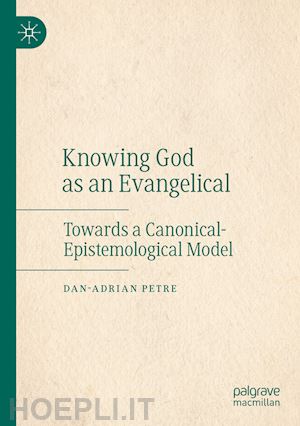
Questo prodotto usufruisce delle SPEDIZIONI GRATIS
selezionando l'opzione Corriere Veloce in fase di ordine.
Pagabile anche con Carta della cultura giovani e del merito, 18App Bonus Cultura e Carta del Docente
In the present polyphony of evangelical theological epistemology, there are several authoritative approaches. Yet, the evangelical emphasis on sola scriptura demands that theological epistemology be subjected to the biblical canon. In this book, Dan-Adrian Petre argues for a canonically-derived theological epistemological framework that may foster a fuller understanding of theological knowledge formation within evangelicalism. Specifically, he explores some representative evangelical voices to identify the reasons for the contemporary epistemological variance. Petre then uses a canonical-epistemological methodology to outline a biblically-based framework. In exploring how the Scripture conceptualizes the formation of theological knowledge, the book uses cognitive linguistics to grasp the conceptual meaning of the theological knowledge formation in the Bible using prototypical case studies. The resulting epistemological implications outline a minimal epistemological model derived from the biblical canon. Using this vantage point, the author assesses the contemporary evangelical epistemological dissonance as a means of indicating a way forward for a canonical-epistemological attunement.
Dan-Adrian Petre is a lecturer in theology at Adventus University of Cernica, Romania.











Il sito utilizza cookie ed altri strumenti di tracciamento che raccolgono informazioni dal dispositivo dell’utente. Oltre ai cookie tecnici ed analitici aggregati, strettamente necessari per il funzionamento di questo sito web, previo consenso dell’utente possono essere installati cookie di profilazione e marketing e cookie dei social media. Cliccando su “Accetto tutti i cookie” saranno attivate tutte le categorie di cookie. Per accettare solo deterninate categorie di cookie, cliccare invece su “Impostazioni cookie”. Chiudendo il banner o continuando a navigare saranno installati solo cookie tecnici. Per maggiori dettagli, consultare la Cookie Policy.